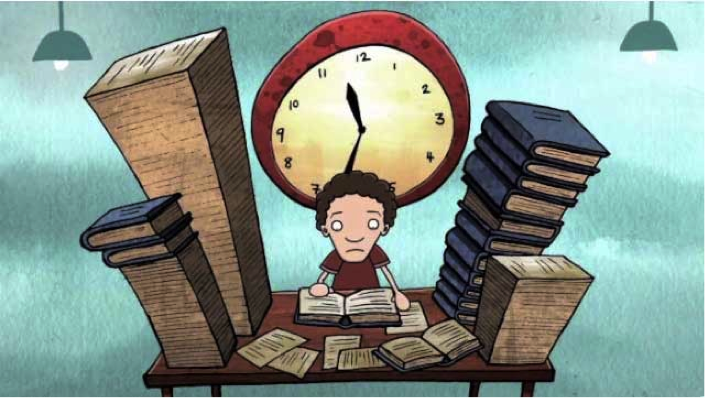- ÍRÁSBELI (WRITING) (120 perc):
- 1. tétel: szövegértés (right/wrong): egy adott szöveg alapján a diáknak el kell döntenie, hogy a megadott 5 mondat igaz/hamis, vagy nem derül ki a szövegből (doesn’t say). (40 pont)
- 2. tétel: szövegértés (multiple choice): egy adott szöveg alapján a diáknak el kell döntenie, hogy a megadott 10 kérdésre A, B, C, vagy D a helyes válasz. (60 pont)
- 3. tétel: levélírás (80-100 szó) (40 pont)
- 4. tétel: esszé (120-200 szó) (60 pont)
1. tétel
Tanácsok a szövegértéshez:
Mindkét szöveghez kapcsolódó mondatok, illetve kérdések követik a szövegek logikai sorrendjét, tehát az első mondatokra/kérdésekre a választ a szöveg első felében kell keresni, és így tovább.
right/wrong:
– Első lépés: olvasd el a teljes szöveget ahhoz, hogy megértsd az általános mondanivalót. NEM kell megállni minden ismeretlen szónál, mivel nem a szavakat, hanem a szövegrészek általános üzenetét kell megérteni. Ha nem értesz egy szót, akkor olvasd el a szó előtti és utáni mondatokat, tehát próbálj a szövegkörnyezetből következtetni a szó jelentésére.
– Második lépés: olvasd el az 5 mondatot, és közben koncentrálj a kulcsszavakra.
– Harmadik lépés: visszatérsz az első mondathoz és a szöveg első részéhez (bekezdéséhez), és választasz A, B, C közül.
Példa az 1. Tételhez: Olvasd el az alábbi szöveget. Az 1-5. mondatok igazak (A), hamisak (B) vagy nem említi a szöveg (C).
Seventeen-year-old Herui Alemayhu came to the United States from Ethiopia two years ago. The teen was excited for a chance to live in a different country, but afraid of how he’d adapt to an American high school. “Making friends was the hardest part for me, I don’t like to be lonely or anything, so I was so scared about making friends,” Alemayhu said.
Teenage life in America is hard regardless of where a kid lives, but for immigrants the transition to high school can be the most challenging. Besides learning a new language, immigrant teenagers have to make friends, and adjust to the different technology that is used in American schools. “There’s a lot of hi-tech stuff here,” Alemayhu said.
“The biggest problem for teens I think is on one side they are still attached to the culture of their parents,” said Bob Ponichtera, executive director and founder of Liberty’s Promise. “We have a lot of sympathy for the parents too because they left everything they had to come here.”
Ponichtera’s grandparents were immigrants that came here from Italy at the turn of the last century. They worked in factories to provide a better life for his parents. His father, in turn, started his own business and was able to send Ponichtera to Yale University.
Most of the students agreed that their moms and dads made those sacrifices to provide a better life for them. “America is good and it’s full of opportunity that we didn’t have in Africa. I really like being here and it feels good,” Charles said.
1. Herui Alemayhu has been in the USA for three years.
A Right B Wrong C Doesn’t say (két évvel ezelőtt érkezett Amerikába, tehát ez azt jelenti, hogy 2 és nem 3 éve él itt)
2. Herui lives in New York.
A Right B Wrong C Doesn’t say (a szövegből nem derül ki, hogy milyen városban élnek, New York nem is szerepel a szövegben)
3. Transition t high school can be difficult.
A Right B Wrong C Doesn’t say
4. Bob Ponichtera comes from a family of Spanish immigrants.
A Right B Wrong C Doesn’t say
5. The problem for immigrants is that they don’t know much about their new country.
A Right B Wrong C Doesn’t say
2. tétel
Multiple choice:
– Első lépés: olvasd el a teljes szöveget ahhoz, hogy megértsd az általános mondanivalót. NEM kell megállni minden ismeretlen szónál, mivel nem a szavakat, hanem a szövegrészek általános üzenetét kell megérteni. Ha nem értesz egy szót, akkor olvasd el a szó előtti és utáni mondatokat, tehát próbálj a szövegkörnyezetből következtetni a szó jelentésére.
– Második lépés: olvasd el a kérdéseket, és koncentrálj a kulcsszavakra, anélkül, hogy elolvasnád az A, B, C, D választási lehetőségeket, próbálj te választ adni, és csak utána olvasd el az A, B, C, D válaszokat.
– NE találgass!!! Indokold meg (a szövegben megtalált, kiemelt mondattal – lásd az alábbi szövegben kiemelt és aláhúzott szövegrészeket), hogy miért pont az A, B, C vagy D a helyes választás
Módszerek:
Válaszolunk a kérdésre az előre megadott A, B, C, D opciók elolvasása előtt.
Elolvassuk a megadott A, B, C, D opciókat, és eldöntjük, hogy melyik a helytelen válasz (kizárásos módszer).
Példa a 2. tételhez: Olvasd el az alábbi szöveget. Az 1–10. kérdésre válaszd a megfelelő opciót (A, B, C, D).
The Importance of Friends
Your relationships with friends become especially important during the teen years. Friendships are relationships between people who like each other and who have similar interests and values. Good friendships generally begin when people realize that they have common experiences, goals, and values.
Each person must also show a willingness to reach out, to listen, and to care about the needs of the other person. Forming strong friendships is an important part of social health. To make new friends, get involved in activities at school or in the community. For example, join a school club or volunteer at a local youth group. When you participate in activities that you enjoy, you’re likely to meet others who share your interests.
A friend is much more than an acquaintance, someone you see occasionally or know casually. Your relationship with a friend is deeper and means more to you. Although there is no accepted test for friendship, most people whom you call friends will have the following qualities:
– Trustworthiness. Good friends are there for you when you need support. They are honest with you, they keep their promises, and they don’t reveal your secrets. Good friends live up to your realistic expectations. If necessary, these friends would be willing to make sacrifices for you.
– Caring. Good friends listen carefully when you want to talk. They try to understand how you feel. In fact, they empathize with you when you have strong feelings such as joy, sadness, or disappointment. Friends don’t just recognize your strengths and talents—they tell you about them and help you develop them. Caring friends might try to help you overcome your weaknesses, but they accept you as you are. They don’t hold grudges and can forgive you if you make a mistake.
– Respect. Good friends will not ask you to do anything that is wrong or dangerous or pressure you if you refuse. They respect your beliefs because they respect you. They also understand that your opinions may be different from theirs, and they realize that this is healthy. Because you and your good friends usually share similar values, they will not expect you to betray those values. If friends disagree, they are willing to compromise, which means to give up something in order to reach a solution that satisfies everyone.
Most of your friends are probably your peers—people close to your age who are similar to you in many ways. You may be concerned about what your peers think of you, how they react to you, and whether they accept you. Their opinions can affect your ideas of how you should think and act. This is called peer pressure—the influence that people your age have on you to think and act like them.
People of all ages want to be well liked by their peers. You, too, probably would like to be popular. Remember, however, that just being popular isn’t enough. You also want your peers to respect you— to hold you in high regard because of your responsible behavior. (Adapted from Teen Health, 2005)
1. The age when one starts to find friends important is
A. at about 15.
B. at about 8.
C. at about 20.
D. at about 50.
(a tinédzser korosztály 12-18 év között van, tehát az A a helyes válasz)
2. In order to become good friends, two people should
A. have common acquaintances.
B. have common relatives.
C. have common aims.
D. have nothing in common.
(Good friendships generally begin when people realize that they have common experiences, goals, and values., a kiemelt kulcsszavak – good friendship, common experiences – arra utalnak, hogy a C a helyes válasz, illetve a kizárásos módszert alkalmazva az A nem helyes, mivel az acquaintances ismerőst jelent, a B esetében a relatives rokont jelent, a D pedig azt jelenti, hogy nincs semmi közös.)
3. In order to have friends a person should
A. listen to music as much as possible.
B. care about poor people.
C. care about the environment.
D. listen to others and care about them.
(Each person must also show a willingness to reach out, to listen, and to care about the needs of the other person.)
4. One way of making friends is
A. going to school on a regular basis.
B. taking part in group activities.
C. setting up your own club.
D. doing things even if you don’t enjoy them.
(To make new friends, get involved in activities at school or in the community. For example, join a school club or volunteer at a local youth group.)
5. An untrustworthy friend is one who
A. is hardly reliable.
B. likes keeping secrets.
C. does not break a promise.
D. expects too little from you.
(Good friends are there for you when you need support. They are honest with you, they keep their promises, and they don’t reveal your secrets. A trustworthy azt jelenti, hogy megbízható barát. A szövegrész erről szól, tehát az untrustworthy ennek az ellentéte, vagyis valaki, akiben alig bízhatunk meg – hardly reliable)
6. Good friends who listen to you and share your feelings are
A. caring.
B. careful.
C. careless.
D. hopeful.
(Good friends listen carefully when you want to talk, a careful szó azt jelenti, hogy óvatos, a careless nem törődő, a hopeful pedig reményteli)
7. Empathic friends also
A. consider you too weak.
B. always praise your talents.
C. try to develop your strong points.
D. try to develop your weak points.
(empathize with you when you have strong feelings such as joy, sadness, or disappointment.)
8. Grudges in paragraph 5 means:
A. dislikes.
B. fights.
C. favours.
D. faults.
(Caring friends might try to help you overcome your weaknesses, but they accept you as you are. They don’t hold grudges and can forgive you if you make a mistake. Azok a barátok, kik törődnek veled, segítenek a nehézségekben, és elfogadnak úgy, ahogy vagy, tehát nem haragtartók, hanem megbocsátanak, ha hibázol – az ilyen típusú kérdésnél mindig el kell olvasni az egész bekezdést.)
9. Persons who respect you as a friend
A. will expect you to be always healthy.
B. will try to convince you that their opinion is the right one.
C. will accept that you may see things differently.
D. will expect you to often change your set of values.
(They also understand that your opinions may be different from theirs, and they realize that this is healthy.)
10. According to the article, peer pressure makes you
A. steal from your friends.
B. avoid going out with.
C. listen to your friends.
D. imitate your friends.
(Their opinions can affect your ideas of how you should think and act. This is called peer pressure—the influence that people your age have on you to think and act like them.-ha nem érted a „peer” szót, a szövegben megtalálod a meghatározást- a korosztály befolyása)
Javítókulcs:
1. tétel: 5 válasz x 8 pont = 40 pont
2. tétel: 10 válasz x 6 pont = 60 pont
Elért szint:
–: 0-10 pont
A1: 11-30 pont
A2: 31-60 pont
B1: 61-80 pont
B2: 81-100 pont
3. tétel
Levélírás
Mindkét írásbeli esetében az elvárásokhoz tartozik a tartalom, a layout (kinézet), vocabulary (megfelelő szókincs), grammar (megfelelő nyelvtani struktúrák használata).
1. Informal letter:
1.1 Useful language (hasznos szókincs):
Beginnings
- Thanks for your letter. It was great to hear from you.
- Sorry I haven’t written for so long. I’ve been really busy recently.
- I thought I’d better write and let you know that…
Endings
- That’s about all my news. Do write soon and let me know what you’ve been doing.
- Once again, thanks very much for all your help last week.
Apologizing
- I’m really sorry that I couldn’t come to your party but unfortunately I had flu all weekend
Inviting/reacting to invitations
- Why don’t you come and stay at my house next weekend?
- Thanks for the party invitation. I’d love to come.
- It was really kind of you to invite me to come sailing, but I’m afraid I’m going away with my parents that weekend.
Requests
- Do you think you could find out how much tickets for the concert are going to be?
- Would it be all right if I borrowed your car?
Congratulations
- Congratulations on getting the job
- Jim and I just wanted you to know how pleased we were that you did so well in your exams.
1.2 példa:
Next month you are going on holiday. Now you are writing to a English speaking friend to: tell them about your holiday plans and ask them about theirs, make an arrangement to see them before the holiday.
Dear Peter, (Találj ki egy nevet! Ne így kezdd: Dear friend!)
Sorry I haven’t written for ages, but I’ve been very busy revising for exams. I’m sure you must have been doing the same. It’s great they’re all over but now we just have to wait for the results! (az első bekezdésben általános információkat közlünk, elnézést kérünk, ha rég nem írtunk, vagy megindokoljuk, hogy miért írunk)
Anyway, how are you? I’m really looking forward to the holidays. I’m going to Spain with a group of friends. I can’t wait to get some sun, go swimming and lie on the beach. It’ll be fantastic! What are you doing for your summer holiday? (a levelet bekezdésekre osztjuk – ez legyen nyilvánvaló, mivel sokat számít a külalak)
I would love to see you before I go, so perhaps we could meet up some time. I’m free all next weekend, so why don’t you give me a call and we can arrange something?
Do say ‘Hi!’ from me to all your family.
Love,
Dani (Megfelelően zárjuk a levelet.)
2. Transactional letters:
- Giving information
- Asking for information
- Making a complaint
- Asking for suggestions
1.1 Useful language (hasznos szókincs):
Requesting information:
- I am writing in response to your advertisement in Friday’s edition of The Times
- I would be grateful if you could send me…
- I am writing to enquire about…
- I would like to know more about
Complaining:
- I am writing to you about an unfortunate incident that took place in your shop yesterday
- To make matters worse, we were told that there was no record of our reservation
- I would be grateful if you could refund the cost of the holiday as soon as possible
1.2 példa:
You recently read and advertisement for English courses. You are interested in attending the course but you would like some more information. Write a letter to the school in an appropriate style.
Dear Sir/Madam, (Ha nem tudjuk, hogy pontosan kinek írjuk, akkor így kezdjük.)
I am writing in response to your advertisement in yesterday’s edition of The Guardian. I am very interested in your courses and would be grateful if you could let me have some more information about them. (Az első bekezdésben indokold meg, hogy miért írsz.)
Firstly, I am intending to do a course for the First Certificate exam, so I would like to know when the next course will start and finish, and also how many hours a week the course is.
In addition, could you tell me what kind of social activities the school offers? I am particularly keen on sports.
Finally, I would be interested in staying with a local family but would like to know how far these families are from the school and the local town. (Használj kötőszavakat: firstly, secondly, in addition, finally.)
I look forward to hearing from you (Ez a helyes nyelvezet a formal letter esetében)
Yours faithfully, (Ha a levelet úgy kezdjük, hogy Sir/Madam, akkor úgy zárjuk, hogy yours faithfully, ha pedig úgy kezdjük, hogy Dear Mr. Brown, akkor úgy zárjuk, hogy Yours sincerely – ez csupán a formal letter típusra érvényes.)
Christina Perez
4. tétel
Esszé
1.1 Useful language (hasznos szókincs):
Some people claim that (your teenage years are the best years of your life)
It is often said that (TV is a bad influence on young people)
However, in my view/opinion, …
Firstly it is clear that (money cannot buy happiness)
While it is true that (computer games re stimulating, they may not be good for you in long term)
Giving opinion (hogyan fejezzünk ki véleményt angolul)
- It is often said that…
- In my opinion,..
- As far as I’m concerned…
- I think…
- From my point of view…
Linking expressions (kötőszavak, kifejezések)
- Firstly, …
- In addition…
- However,…
- Although, even though, despite (ellentétes gondolatok bevezetése)
e.g. Although many people think that capital punishment is necessary, it is also true that people have been sentenced for crimes they did not commit.
Concluding expression (befejező-összegző kifejezések)
- To sum up, I feel that…
- In conclusion,…
- Finally, it is important to remember that…
- On balance then, I feel that…
1.2 példa:
Write an essay giving your opinion on the following statement:
People in the modern world depend too much on computers.
Model answer:
In today’s world, nearly every aspect of life is affected by computer technology. Computers are used for business, public services, education and entertainment. (Az első bekezdésben meg kell említeni az esszé témáját, ne azzal kezdjük, hogy I agree with this – egyetértek ezzel a kijelentéssel.)
Some people are concerned by this development. They fear that vital skills are being lost as computer technology replaces traditional ways of working in a wide variety of areas, from art design to banking and commerce. They point out the chaos that can occur when computer systems fail, leading to the breakdown of essential services such as transport, law and order. (Az esszé tartalmazzon példákat, akár személyes tapasztalatból merített ötleteket, melyekkel alátámasztjuk az állításokat, véleményeket.)
However, people could not continue to enjoy their present standard of living without computer technology. There are now far more people in the world than there were a generation ago. The fact that there is enough food for them, that they can travel safely form one place to another, and that they cam be provided with medical care, is largely due to computer technology.
In my opinion, therefore, we have to accept our dependence on computers, but at the same time we should work to find ways of making this dependence less dangerous. (Ne felejtsd el, hogy az utolsó bekezdés kell tartalmazza a te saját véleményed.)
A 4. tétel második feléhez az esszé helyett lehet más hosszabb írásbeli feladatot kapni, ilyen például: write a book or film review, write a report, write an article.
Useful language (hasznos szókincs)
1. Review:
Introduction: The film/book that I would like to review is…; The last film I saw/book I read was…
Summarizing: It’s set in…; The story is based on a book…; It’s about…; The main theme of the film/book is…; What the film/book is saying is…
Recommending the film/book: I would recommend this film/book to anyone; Although I enjoyed it I would not recommend it for…; It’s one of the best films I’ve ever seen; It’s one of the best books I’ve read; The film/book lifts you out of your everyday life.
Other: The film/book is really exciting because…; The best moment is when; The book tells the story of…; The first thing that happens is…; The main character,…; The most interesting/memorable character is…; The title is really good because…; The story takes place in…; The ending is really exciting because…; The best thing about the book is that…; I would recommend this book because it is easy to read.
2. Report:
Introduction: The aim of this report is to…; This report is intended to…
Reporting results: Most people seem to feel that; Several people said/told/suggested/thought that…
Presenting a list: They gave/suggested the following reasons…; The made the following points: 1…, 2….
Making recommendations: I would therefore recommend; It would seem that (banning mobile phones) is the best idea
3. Article:
Ebben az esetben nagyon fontos érdekes címet adni, ami felkelti az olvasó érdeklődését, illetve tartalmazzon kérdéseket:
Involving the reader: Are you thinking of….?; I’m sure you’ll agree…
Developing the points: Let’s start with; Another advantage (of using a computer is that..); On top of that…
Giving your opinion: I think that (traditional celebrations are important), It seems to me that (people are much more aware of the importance of a good diet nowadays).
Javítókulcs:
1. Levélírás: (40 pont)
– tartalom: 20 pont
– külalak: 10 pont
– nyelvtan: 5 pont
– szókincs: 5 pont
2. Esszé: (60 pont)
– tartalom: 30 pont
– külalak: 10 pont
– nyelvtan: 10 pont
– szókincs: 10 pont
Elért szint:
–: 0-10 pont
A1: 11-30 pont
A2: 31-60 pont
B1: 61-80 pont
B2: 81-100 pont
2. HALLOTT SZÖVEG ÉRTÉSE (LISTENING) (20 perc)
A hallott szöveg értése két részből áll: az első részben 4, a második részben 6 kérdésre kell A, B, C, D opciók közül választani.
Tanácsok:
- A szövegeket kétszer hallgatják meg a diákok, tehát ha első alkalommal nem sikerült válaszolni, akkor van még egy lehetőség ezt megtenni.
- A szöveg meghallgatása előtt olvasd el a kérdéseket és figyelj a kulcsszavakra
- Hallgasd végig a beszélőt! NE az első hallott mondat után jelöld a helyes választ, mert lehet, hogy a hallott szöveg vége tartalmazza a megoldást.
Javítókulcs:
1. tétel
4 helyes válasz x 10 pont= 40 pont
2. tétel
6 helyes válasz x 10 pont = 60 pont
Elért szint.
–: 0-10 pont
A1: 11-30 pont
A2: 31-60 pont
B1: 61-80 pont
Példa hanganyag a hallott szöveg értése részhez:
http://www.ebacalaureat.ro/bac/bac2012/sub2012/probaC_englez-model-audio.mp3
3. SZÓBELI
A szóbeli 3 kérdésből áll. A diákoknak lehetősége van 15 percig kidolgozni a tételeket, és utána 10-15 perc alatt bemutatni a vizsgáztató bizottság előtt.
Tanácsok:
- A mondanivaló legyen strukturált: bevezetés, tárgyalás, befejezés (NE a saját vélemény kifejtésével kezdjük, ezt mindig írásban és szóban is a szöveg végére kell hagyni)
- Hangosan, érthetően és kifejezően beszéljünk, ha nem értjük, hogy mit akar a vizsgáztató tanár kérdezni, akkor a következőképpen fejezzük ki magunkat:
e. g I’m sorry. I didn’t understand. Could you repeat that please? Thank you.
Useful language/hasznos szókincs:
1. Asking for repetition:
Could you say that again?
I’m sorry, I didn’t catch that.
Did you say ( )?
2. Stalling for time:
Well, let me see.
In my case, …
Hmm, I’d have to say …
3. Saying something negative:
I’m sorry but …
I’m afraid (to say that) …
To be (perfectly) honest, …
4. Giving an example
For example, …
A good example is …
Maybe you’ve heard of …
5. Describing frequency:
Every other day, … (= Frequently)
Once in a while, … (= Occasionally)
Once in a blue moon, … (= Rarely)
6. Adding more:
Also, …
Another thing (as well) is …
What else? Oh, I …
7. Comparing with the past:
But when I was (a bit) younger I used to …
But in my school days I used to …
But back in the day I used to … (= In the distant past)
8. Comparing self with others:
But some of my friends …
But I know there are others who …
But it takes all sorts, I suppose. (= Everyone is different.)
9. Expressing a hope:
But I’d like to try it if I ever get the chance.
But it would be nice to try it someday.
But hopefully luck will shine on me one day. (= Hopefully I’ll get the chance.)
10. Finishing:
So, that’s a bit about my …
Anyway, that’s my …
So, to cut a long story short, … (= To sum up)
Példa:
1. Answer the following questions: Is there any kind of entertainment you do not like? Why
(not)?
2. Describe a friend of yours.
3. Give your opinion on the following statement: Apart from family and friends, there are other types of relationship which are important in people’s lives. Use relevant arguments and examples to support your ideas.
Javítókulcs:
1. tétel (20 pont)
2. tétel (30 pont)
3. tétel (50 pont)
Elért szint:
–: 0-10 pont
A1: 11-30 pont
A2: 31-60 pont
B1: 61-80 pont
B2: 81-100 pont
A dokumentum ITT tölthető le.
 |
Gál Tünde,a kolozsvári János Zsigmond Unitárius Kollégium angoltanára
|










